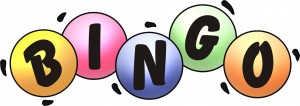Who is it for?
Anyone trying to help students develop their use of evidence and its application.
Outline of idea

My GCSE Philosophy and Ethics students sometimes have real trouble remembering to use evidence in their essays. In addition they often forget to explain the relevance of any evidence they offer.
To play Evidence Bingo students took a sheet of paper and made a 3×4 grid. Into each box the students were asked to choose a piece of “evidence” (in this case a quote, principle, argument etc.) that they thought they might be able to apply in as many situations as possible.
Once every student had their own grid I chose a topic. If students could apply a piece of evidence to the topic given they were allowed to cross the evidence off their grid. Students were asked to explain to each other how the evidence they were offering could be applied to the topic in order to compare notes and get practice at application. (If more than one piece of evidence could be used then students had to choose one piece to cross off).
Mar
02
Evidence Bingo
Small prizes were given for the first student to complete a row/column/full house etc. This really enthused them to attempt to apply their evidence fully.
How it worked out
We had a lot of fun with this. Students valued the chance to practise applying evidence to a variety of situations. They also saw how the same evidence can be applied in a variety of situations.
We also noted that some pieces of evidence are particularly useful in lots of different topics. This was a helpful reminder for those who find it difficult to learn quotes!
Next steps
This could just as well be used in history. It’s possible that an MFL teacher might be able to adapt the model for learning vocabulary.